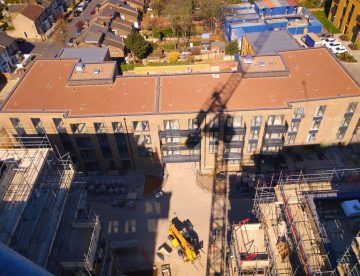
Yesterday was Earth Day, an annual event when organisations and individuals around the world celebrate our remarkable planet and demonstrate support for environmental conservation and sustainability.
It’s got us thinking about some of the actions our industry can take – everything from reducing plastic waste and minimising the use of water on site to going paperless and lowering energy consumption at the office. Another idea is to purchase pre-used construction equipment but there are several considerations to take on board around this so let’s explore those in this week’s blog.

While construction has long been known for its focus on hard work and technical expertise, research suggests that one of the key strengths of our industry comes from it having embraced a broader range of thinking styles and experiences beyond the ‘typical’.
A new study by the Association for Project Management (APM) has revealed that almost half (46%) of construction professionals identify as neurodivergent, compared to a cross-sector average of 31%. Read on to find out more about what this means and the potential benefits this offers for our industry.

In recent years, drone technology has made it far easier to view aerial images of the UK’s urban landscape. But, while our towns and cities are hugely diverse in architectural character, looking down from above they are often very similar, with a common sight being a mass of black, brown and grey roofs.
However, there is a trend which has started to add patches of colour to the aerial perspective – green roofing! In this week’s blog, we’ll explain more about what a green roof is and look at six reasons why this is proving to be a great option for our buildings.

It’s fairly common for construction workers to question whether they need to follow an exercise regime, considering the fact that they already do a lot of physical activity in their daily work.
While it’s true that construction work involves a mix of low-intensity and heavier physical activity that might seem like a good workout, research has shown this doesn’t match the numerous health benefits that come from recreational physical activity. In this week’s blog, we’re taking a closer look at this topic.

One day last week, our Managing Director was in attendance at two separate awards ceremonies and, although he was there as a guest rather than a nominee, he did find himself by the winners side at both events.
One of the winners was a carpentry firm that won a supply chain award with a well-known contractor and the other was a charity that won a BBC Three Counties Make a Difference award. Clearly these were two very different organisations but it was interesting to observe them as they both took on the ‘award winning’ accolade.
Here at Sheriff Construction, we’ve been recognised at industry awards in the past but witnessing two new winners all on one day made us wonder about the benefits that such awards offer and whether there are key qualities that make a ‘winner’. Read on to find out more.

Earlier this month, we reported on how the construction industry in the UK will need over a quarter of a million extra workers by 2026, including 26,000 in Greater London and 24,600 across the East of England.
This is going to be a real challenge, not least because the numbers of young people looking to enter the sector are far below the numbers of older workers who are leaving their trade. One YouGov Omnibus survey found that only 3% of young people aged 18-24 had searched for a job in construction.
As schools and colleges across the country come to a close, it’s likely there are a great many young people who haven’t fully decided what to do next. To help, we thought we’d share what we know about some of the key construction trades and so the focus of today’s blog is roofing.
As we near the end of August, you can’t help but notice all the ‘back to school’ signs and merchandise laid out at the front of the shops. This got us thinking about how, nowadays, the idea of getting back into learning mode is no longer reserved just for children and young people. The principle of ‘lifelong learning’ has long been something that many adults have embraced but, as our world continues to change at such a fast pace, this seems to be becoming more important than ever. In this week’s blog, we’re exploring the multiple professional and personal benefits that following this approach offers.

The summer holidays – a time when, like many others, people working in construction often disappear for a while (on their holidays or for family visits). But, did you know that, in the UK and for various reasons, more than half of people don’t take their full holiday entitlement? The problem, however, is that such efforts can be counter-productive as taking a break actually offers all kinds of benefits, both to the individual and the companies they work for. This week’s blog outlines the key points.


